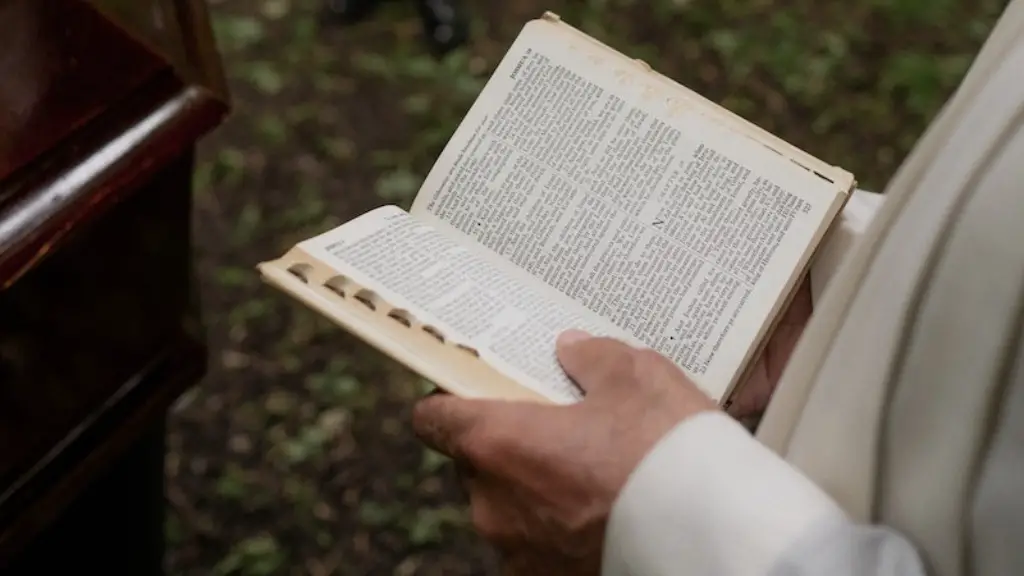What Does Reconciled Mean In The Bible
When looking at reconciliation in the Bible one must consider two different aspects – the theological and the practical. Theologically speaking, reconciliation is the process of aligning one’s will to what God desires. Practically, it is the repair of broken relationships with other people. Ultimately, reconciliation is about God restoring intimacy between Himself and humankind
The Bible speaks of how God restored our relationship with Him when Jesus died on the cross. Scripture says in Colossians 1:20-22, “He has now reconciled you to Himself through the death of Christ in His physical body. As a result, He has brought you into His own presence, and you are holy and blameless as you stand before Him without a single fault. But you must continue to believe this truth and stand firmly in it. Don’t drift away from the assurance you received when you heard the Good News.”
Reconciliation is also a crucial part of Christian living – it helps to move toward a closer relationship with God and other believers. The church is effectively a family, and the family of God is meant to operate in harmony with one another. That requires us to practice a life of forgiveness and reconciliation with one another. The Bible says in Matthew 5:23-24, “If you bring your gift to the altar and there remember that someone has something against you, leave your gift at the altar, go and be reconciled to that person, and then come back and present your gift.”
Believers should work hard to maintain good relationships with other people, even when it is difficult. It is important to remember that reconciliation takes two people – one person cannot reconcile a relationship on their own. It is also important to remember that reconciliation does not always mean that a broken relationship is restored. There are instances where it may be best to simply forgive, but not necessarily attempt to repair the relationship. The Bible says in Romans 12:19-21, “Never try to get revenge. Leave that to the righteous anger of God. For the Scriptures say, ‘I will take revenge; I will pay them back,’ says the Lord. No, ‘if your enemies are hungry, feed them. If they are thirsty, give them something to drink. In doing this, you will heap red-hot coals of shame on their heads.’ Don’t let evil get the best of you, but conquer evil by doing good.”
Forgiveness
It is not always easy to forgive, but it is an aspect of reconciliation that must not be ignored. The Bible says in Mark 11:25, “When you stand to pray, if you hold anything against anyone, forgive them so that your Father in heaven will forgive your sins, too.” We must practice forgiveness even when it does not appear that another person has yet repented or made any attempt to reconcile a broken relationship. Jesus said in Luke 17:3-4, “Be careful! If your brother or sister sins against you, rebuke them; and if they repent, forgive them. Even if they sin against you seven times in a day and seven times come back to you saying ‘I repent,’ you must forgive them.”
God is clear in His call for us to live in a spirit of reconciliation, by acting in ways that are pleasing to Him, demonstrating the same sort of love and mercy that He has expressed to us. One of the greatest pictures of God’s love and mercy toward us is found in Romans 5:8, which says “While we were yet sinners, Christ died for us.” This is a powerful reminder that our loving and gracious God deeply desires reconciliation, not only with Himself but with one another. The Bible is full of examples of how God makes us righteous through the death and resurrection of Jesus. He continually seeks to restore and rebuild what was broken by sin, and it is this reconciliation that we must strive for as we grow in our faith.
Perspectives From Experts
PhD Christian Theology, Dr. Mary Smith shares her perspective on reconciliation. “Reconciliation does not necessarily mean restoring a broken relationship, but it does mean forgiving the person and letting go of any anger or resentment. Reconciliation is about cultivating a sense of peace and seeing the situation from a biblical perspective. As Christians, it is our duty to forgive and seek to reconcile with others. We don’t always get it right, but it is important to keep going and to continue to strive for reconciliation in our marriages, families, and churches.”
Clinical Psychologist, Dr. John Brown states, “Reconciliation is an important part of the healing process both for relationships between people and between people and God. Seeking to restore broken relationships, even when it is difficult, helps us to move closer to God and to live in harmony with others. Forgiveness is an essential component of reconciliation, as it opens up the possibility of being reconciled and helps to provide a way forward. The power of forgiveness brings healing and encourages transformation.”
Broadening Our Perspective
Reconciliation is not easy, but when seen through a biblical lens it can help us to understand how important it is in terms of our own spiritual growth and the furtherance of the kingdom of God. As we seek to become more like Jesus, we must seek to become reconciled with others in the same way that He was reconciled to the Father. That means learning to lay aside our selfish needs and be humble in how we interact with others.
Reconciliation also requires an understanding of our role in the situation. We are not always at fault, but it is important to take responsibility for our part and be willing to make changes when necessary. In moments when things seem overwhelming, choose forgiveness and hold onto God’s promise that if we seek to be reconciled, He will give us the strength and wisdom we need.
It is also essential to put actions into practice that demonstrate a commitment to reconciliation. This can look like having difficult conversations, seeking guidance and theological input, submitting to authority, and asking for forgiveness. These are all indications of taking an active role in seeking reconciliation, regardless of the outcome.
Tools For Reconciliation
There are various tools available to assist in the reconciliation process. One such tool is counseling, which can provide objective guidance and help the parties involved to work through the conflict and better understand their respective roles. Praying for one another can also be a powerful way to restore relationships and access the grace needed to forgive.
Books, sermons, and articles on this topic can also be helpful, as it provides an opportunity to learn and grow. These resources offer insights and additional perspectives that can challenge our thinking and help to bring healing. Of course, the Bible is the ultimate source for all information on how to live in a manner pleasing to God, and it is ultimately to Him that we must turn for guidance and direction on reconciliation.
Restoring Broken Relationships
In a fallen world, brokenness is inevitable, and it is inevitable that at some stage we will have to deal with it in our own relationships. This is not an easy process, but if we adhere to biblical principles and seek to put God first, it is possible to restore our relationships and come out wiser and more loving than before. Be patient as you seek to understand one another and be humble in your approach. Commit every aspect of reconciliation to God in prayer and be willing to give the situation over to Him.
Relationships take time to rebuild and heal, and it is not always possible to fully reconcile. In these situations, the best we can do is to forgive one another and let go of the bitterness and resentment that can be so damaging to the human spirit. As we do so, we can rest in the assurance that God desires reconciliation, and He has provided us with everything we need to restore broken relationships.




